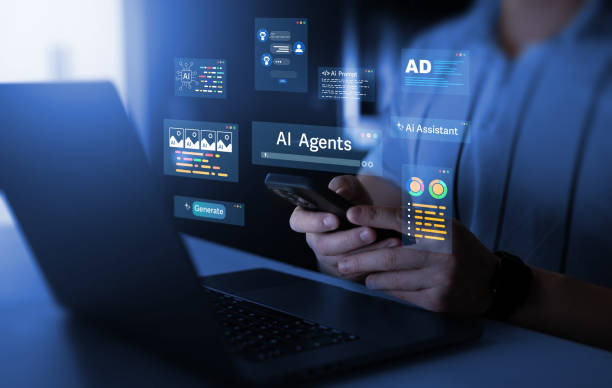`
What is Artificial Intelligence? Definition, History and Basic Concepts
Artificial intelligence (#AI) is a branch of computer science that deals with building machines capable of performing tasks that usually require human intelligence.
These tasks include learning, reasoning, problem-solving, perception, and natural language processing.
In fact, the goal of artificial intelligence is to build systems that can think and act like humans.
The history of artificial intelligence dates back to the 1950s, when scientists such as Alan Turing and John McCarthy began exploring the possibility of building intelligent machines.
Over the decades, artificial intelligence has made significant advances, including the development of expert systems, neural networks, and machine learning.
Today, artificial intelligence is used in a wide range of industries and applications, including self-driving cars, facial recognition, language translation, and virtual assistants.
Basic concepts in artificial intelligence include Machine Learning, Deep Learning, Natural Language Processing, Computer Vision, and Robotics.
Each of these areas addresses a specific aspect of artificial intelligence and helps develop intelligent systems.
Artificial intelligence uses complex algorithms and models to analyze data, identify patterns, and make decisions.
For more information on the history of artificial intelligence, you can visit the Wikipedia page.
Are you tired of your company’s website not being seen as it should and losing potential customers? Solve this problem forever with professional and effective website design by Rasaweb!
✅ Increase brand credibility and gain customer trust
✅ Attract targeted sales leads
⚡ Contact us now for a free consultation!
Types of Artificial Intelligence in Terms of Ability and Application
Artificial intelligence can be divided into different categories based on ability and application.
In terms of ability, artificial intelligence is divided into three main categories: Narrow AI, General AI, and Super AI.
Narrow AI, also known as weak AI, is designed to perform specific tasks and performs very well in those tasks.
Examples of narrow AI include virtual assistants such as Siri and Alexa, facial recognition systems, and recommendation algorithms.
Click here to preview your posts with PRO themes ››
General AI, also known as strong AI, has cognitive abilities similar to humans and can perform any task that a human is capable of performing.
General AI is still under development and has not yet been fully realized.
Super AI is intelligence that surpasses human intelligence and can solve problems that humans are unable to solve.
Super AI is a hypothetical concept and does not currently exist.
In terms of application, artificial intelligence is used in a wide range of industries, including healthcare, finance, manufacturing, transportation, and entertainment.
In each of these industries, artificial intelligence can help improve efficiency, reduce costs, and provide better services.
For example, in healthcare, artificial intelligence can help diagnose diseases, develop drugs, and provide personalized care.
For more information on the applications of artificial intelligence, you can visit the IBM website.
Machine Learning and Deep Learning are the Backbone of Artificial Intelligence
Machine Learning and Deep Learning are two key concepts in artificial intelligence.
Machine learning allows machines to learn from data without explicit programming.
In other words, machines analyze data, identify patterns, and use these patterns to make predictions or decisions.
Deep learning is a subset of machine learning that uses deep neural networks to learn from data.
Deep neural networks consist of multiple layers of nodes that are connected to each other.
These layers allow machines to identify more complex patterns in the data.
Machine learning and deep learning are used in a wide range of applications, including image recognition, natural language processing, speech recognition, and customer behavior prediction.
These two concepts help develop intelligent systems that can automatically perform complex tasks.
In the table below, you can see some of the common machine learning algorithms:
| Algorithm | Description |
|---|---|
| Linear Regression | For predicting continuous values |
| Logistic Regression | For classifying data |
| Decision Tree | For making decisions based on a set of rules |
| Support Vector Machine | For classification and regression |
| Neural Network | For learning complex patterns in data |
For more information on machine learning, you can visit the Google Developer page.
Applications of Artificial Intelligence in Various Industries
Artificial intelligence is currently used in a wide range of industries and has a significant impact on them.
In healthcare, artificial intelligence can help diagnose diseases, develop drugs, and provide personalized care.
For example, intelligent systems can analyze medical images and detect signs of disease earlier than doctors.
In the financial industry, artificial intelligence can help detect fraud, manage risk, and provide personalized financial services.
Artificial intelligence algorithms can analyze financial transactions and identify suspicious patterns.
In the manufacturing industry, artificial intelligence can help improve efficiency, reduce costs, and increase product quality.
Intelligent robots can perform repetitive and dangerous tasks, and intelligent systems can optimize production processes.
In the transportation industry, artificial intelligence can help develop self-driving cars, optimize routes, and reduce traffic.
Self-driving cars can drive without human intervention, and intelligent systems can plan routes to reduce traffic.
In addition to these industries, artificial intelligence has many applications in other areas such as education, entertainment, security, and agriculture.
It is expected that as artificial intelligence advances, its applications will become more widespread in the future and have a greater impact on our lives.
Artificial intelligence, with its many capabilities, can help solve many of society’s problems.
Are you tired of your company’s website not meeting your expectations? Design a professional website with Rasaweb that showcases the true face of your business.
✅ Increase the attraction of new customers and sales leads
✅ Increase your brand’s credibility and trust among audiences
⚡ Get a free website design consultation!
Advantages and Disadvantages of Using Artificial Intelligence
Using artificial intelligence has several advantages and disadvantages.
Some of the advantages include increased efficiency, reduced costs, improved accuracy, and better service delivery.
Artificial intelligence systems can perform tasks faster and more accurately than humans and can automatically perform tasks that humans are unable to perform.
However, using artificial intelligence also has disadvantages.
Some of the disadvantages include high development and implementation costs, the need for large amounts of data, the risk of job loss, and ethical concerns.
Artificial intelligence systems need a lot of data to learn and may provide incorrect results if sufficient data is not available.
Also, some people are concerned that artificial intelligence will lead to job losses, as machines can perform tasks that were previously performed by humans.
In addition, there are ethical concerns about the use of artificial intelligence.
For example, questions arise about privacy, discrimination, and accountability.
Artificial intelligence systems may collect and use personal information and may make decisions that are discriminatory.
Also, it is unclear who is responsible for decisions made by artificial intelligence systems.
Overall, the use of artificial intelligence has several advantages and disadvantages and should be carefully considered.
We should strive to benefit from the advantages of artificial intelligence while avoiding its disadvantages.
Artificial intelligence is a powerful tool that can help improve our lives, but we must use it responsibly.
Challenges and Future of Artificial Intelligence
Despite significant advances, artificial intelligence still faces several challenges.
One of the main challenges is the lack of training data.
Artificial intelligence systems need a lot of data to learn, and collecting and preparing this data can be time-consuming and costly.
Another challenge is Explainability.
Many artificial intelligence systems, especially those that use deep learning, act like a black box, and it is unclear how they arrived at a particular result.
This can reduce confidence in these systems and limit their use in some applications.
In addition, ethical and legal issues also create challenges for artificial intelligence.
Questions arise about privacy, discrimination, and accountability, and appropriate laws and regulations must be enacted to regulate the use of artificial intelligence.
Despite these challenges, the future of artificial intelligence looks very bright.
It is expected that with the advancement of technology, artificial intelligence will be used in a wider range of industries and applications and will have a greater impact on our lives.
Artificial intelligence can help solve many of society’s problems and create new opportunities for innovation and progress.
For example, artificial intelligence can help develop new drugs, improve education systems, and provide better services to people in need.
Impact of Artificial Intelligence on the Labor Market and Economy
Artificial intelligence will have a significant impact on the labor market and economy.
On the one hand, artificial intelligence can automate many tasks and lead to job losses.
On the other hand, artificial intelligence can create new job opportunities and lead to increased productivity and economic growth.
Studies have shown that artificial intelligence can automate many repetitive and routine tasks and lead to a decrease in demand for these types of jobs.
However, artificial intelligence can also create new jobs that require new skills.
For example, jobs in the development, implementation, and maintenance of artificial intelligence systems will be needed.
In addition, artificial intelligence can lead to increased productivity and economic growth.
Artificial intelligence systems can perform tasks faster and more accurately than humans and can automatically perform tasks that humans are unable to perform.
This can lead to reduced costs, increased production, and improved quality of products and services.
In the table below, you can see some of the impacts of artificial intelligence on jobs:
| Impact | Description |
|---|---|
| Job Automation | Replacing human labor with artificial intelligence systems |
| Creating New Jobs | The need for specialties related to the development and maintenance of artificial intelligence |
| Increased Productivity | Optimizing processes and reducing errors |
| Changing the Skills Required | The need for analytical and problem-solving skills |
Ethics in Artificial Intelligence: Considerations and Challenges
Ethics in artificial intelligence refers to the set of principles and values that should be observed in the design, development, and use of artificial intelligence systems.
Given the widespread impact of artificial intelligence on human life, the ethical issues associated with it have become very important.
One of the main issues is privacy.
Artificial intelligence systems need a lot of data to learn, and collecting and using this data can violate people’s privacy.
Appropriate laws and regulations must be enacted to protect people’s privacy against the misuse of artificial intelligence.
Another issue is discrimination.
Artificial intelligence systems may make decisions based on the data they have been trained on that are discriminatory.
For example, a facial recognition system may not properly recognize people with darker skin tones.
We must strive to prevent discrimination in artificial intelligence systems and ensure that these systems treat all people fairly.
In addition, the issue of accountability also arises.
It is unclear who is responsible for decisions made by artificial intelligence systems.
If a self-driving car has an accident, who is responsible? The manufacturer, the driver, or the artificial intelligence system? Appropriate laws and regulations must be enacted to determine accountability in artificial intelligence systems.
Research shows that 80% of customers trust companies with professional websites more. Does your current website inspire this trust?
Solve the problem of customer distrust and a weak online image forever with Rasaweb’s corporate website design services!
✅ Create a professional image and increase customer trust
✅ Attract more sales leads and grow your business
⚡ Get a free consultation
How to Learn Artificial Intelligence? Educational Resources and Paths
Learning artificial intelligence is an exciting and challenging process that requires effort and perseverance.
Fortunately, many educational resources are available for learning artificial intelligence, including online courses, books, articles, and practical projects.
One of the best ways to start is by taking online courses.
Websites like Coursera, edX, and Udacity offer a variety of courses in artificial intelligence that are taught by leading university professors.
These courses typically include instructional videos, exercises, and practical projects.
In addition to online courses, books can also be a good source for learning artificial intelligence.
There are many books in this area that fully explain the basic and advanced concepts of artificial intelligence.
Some of the famous books in this area include “Artificial Intelligence: A Modern Approach” by Stuart Russell and Peter Norvig and “Hands-On Machine Learning” by Aurélien Géron.
Also, doing practical projects can help you better understand the concepts of artificial intelligence and strengthen your skills.
You can start with small projects and gradually do more complex projects.
For example, you can build a simple image recognition system or train a stock price prediction model.
Finally, attending artificial intelligence conferences and workshops can help you learn about the latest advances in this area and connect with experts in the field.
These conferences and workshops are a good opportunity to learn from the experiences of others and share your knowledge.
With effort and perseverance, you can learn artificial intelligence and gain expertise in this field.
The Future of Artificial Intelligence in Iran: Opportunities and Challenges
Artificial intelligence in Iran, like other countries in the world, creates several opportunities and challenges.
Iran, with its specialized and young workforce, has a high potential for the development of artificial intelligence.
One of the main opportunities is the use of artificial intelligence to solve the country’s problems and challenges.
Artificial intelligence can help improve efficiency and reduce costs in various fields such as agriculture, healthcare, industry, and transportation.
For example, artificial intelligence can help optimize water consumption in agriculture, early detection of diseases, and improve the quality of industrial products.
Another opportunity is the development of the artificial intelligence industry in Iran.
Iran can support knowledge-based companies by investing in this area and offer artificial intelligence products and services to domestic and foreign markets.
This can lead to job creation and increased national income.
However, there are also challenges in the development of artificial intelligence in Iran.
One of the main challenges is the lack of investment and appropriate infrastructure.
For the development of artificial intelligence, there is a need to invest in research and development, training of human resources, and creating the necessary infrastructure such as data centers and communication networks.
Another challenge is legal and regulatory issues.
Appropriate laws and regulations must be enacted to regulate the use of artificial intelligence in Iran in order to prevent the misuse of this technology and protect the rights and privacy of individuals.
Despite these challenges, the future of artificial intelligence in Iran looks bright.
Given the country’s high potential and the efforts of the government and the private sector, it is expected that artificial intelligence will play an important role in Iran’s economic and social development in the coming years.
Artificial intelligence can help Iran become a leading country in the field of technology and improve its position in the global economy.
FAQ
| Question | Answer |
|---|---|
| What is Artificial Intelligence? | It is the simulation of human intelligence in machines that are programmed to think like humans and mimic their actions. |
| What are the main branches of Artificial Intelligence? | They include machine learning, deep learning, natural language processing, computer vision, and robotics. |
| What is Machine Learning? | It is a branch of AI focused on enabling systems to learn from data and identify patterns without explicit programming. |
| Give examples of AI applications in our daily lives. | Voice assistants (such as Siri and Alexa), recommendation systems in Netflix and Amazon, self-driving cars, and facial recognition software. |
| What is Deep Learning? | It is a subset of machine learning that uses multi-layered (deep) artificial neural networks to process vast amounts of data. |
| What is Natural Language Processing (NLP)? | It is a branch of AI focused on enabling computers to understand, interpret, and generate human language. |
| What are some ethical concerns related to AI? | They include data bias, privacy, job displacement, and accountability in case of errors. |
| What are the main benefits of AI? | Increased efficiency, improved decision-making, automation of repetitive tasks, and discovery of complex patterns in data. |
| How is AI used in the field of healthcare? | In diagnosing diseases, discovering drugs, analyzing medical images, and personal care for patients. |
| How do you see the future of AI? | It is expected to continue to evolve at a rapid pace, affecting all aspects of human life, from industry to education and entertainment. |
And other services of Rasa Web Advertising Agency in the field of advertising
Smart digital advertising: An effective tool to increase the click-through rate with the help of proprietary programming.
Smart advertising campaign: A combination of creativity and technology to increase website visits by managing Google Ads.
Smart custom software: A combination of creativity and technology to increase the click-through rate by using real data.
Smart Google Ads: Transform campaign management with the help of intelligent data analysis.
Smart custom software: An effective tool to attract customers with a SEO-oriented content strategy.
And more than hundreds of other services in the field of internet advertising, advertising consulting and organizational solutions
Internet advertising | Advertising strategy | Advertorial
Sources
What is artificial intelligence? Everything you need to know about artificial intelligence
,Artificial intelligence and the possibility of the end of human civilization; What do researchers say?
,What is artificial intelligence (AI)? Everything about artificial intelligence
,Artificial intelligence; From the perspective of science to its impact on politics
? Rasa Web Digital Marketing Agency is your strategic partner on the path to online brilliance! With services such as professional SEO, social media management and multilingual website design, we guarantee a strong and impactful presence for your business. Contact us today and build the digital future of your business.
📍 Tehran, Mirdamad Street, next to the Central Bank, South Kazerun Alley, Ramin Alley, No. 6














